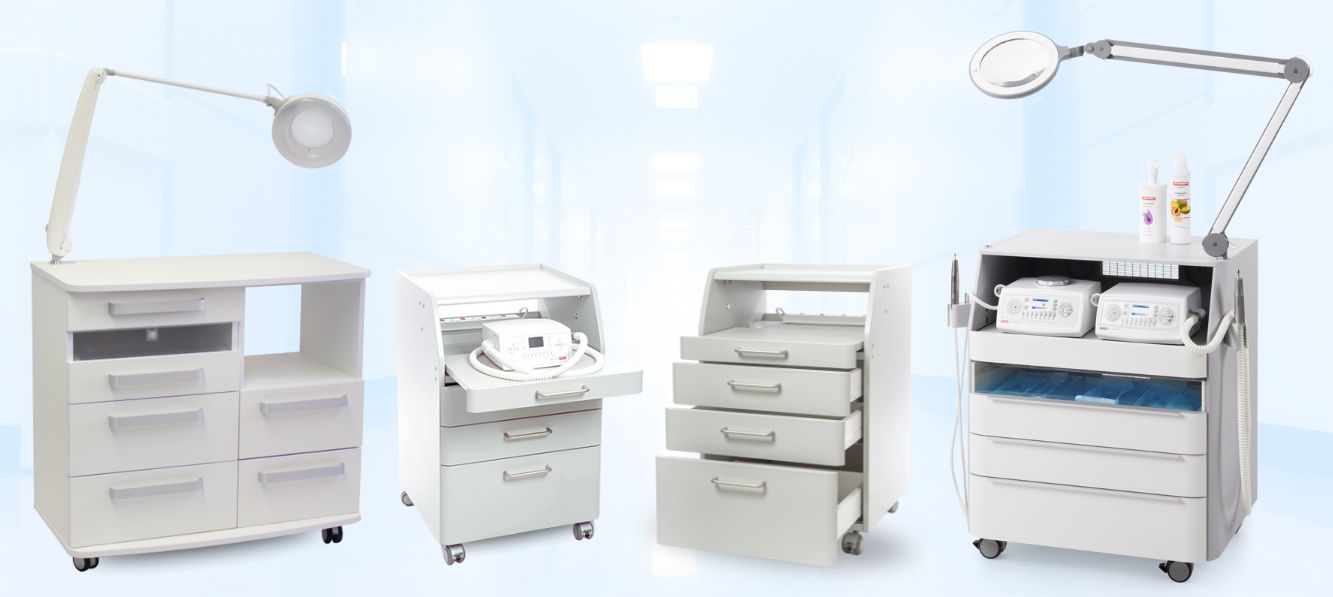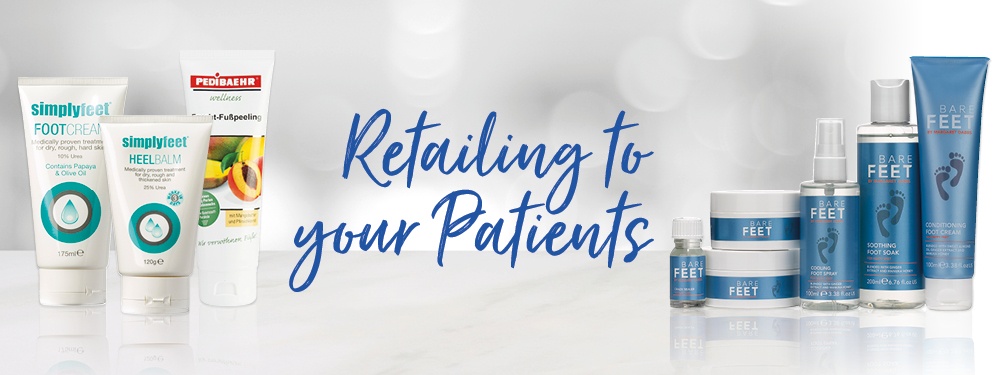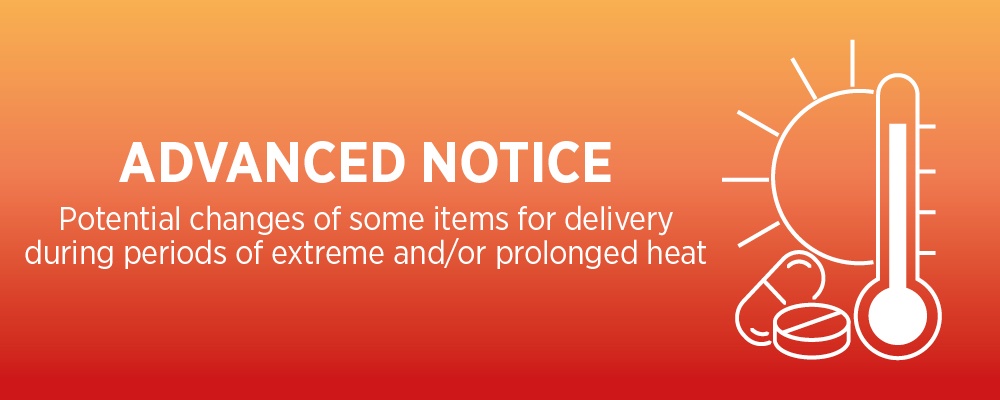Podiatry Burrs Materials, Shapes and Sizes: The Complete Guide
- Sales Team
- Canonbury
- 21 Jul 2025
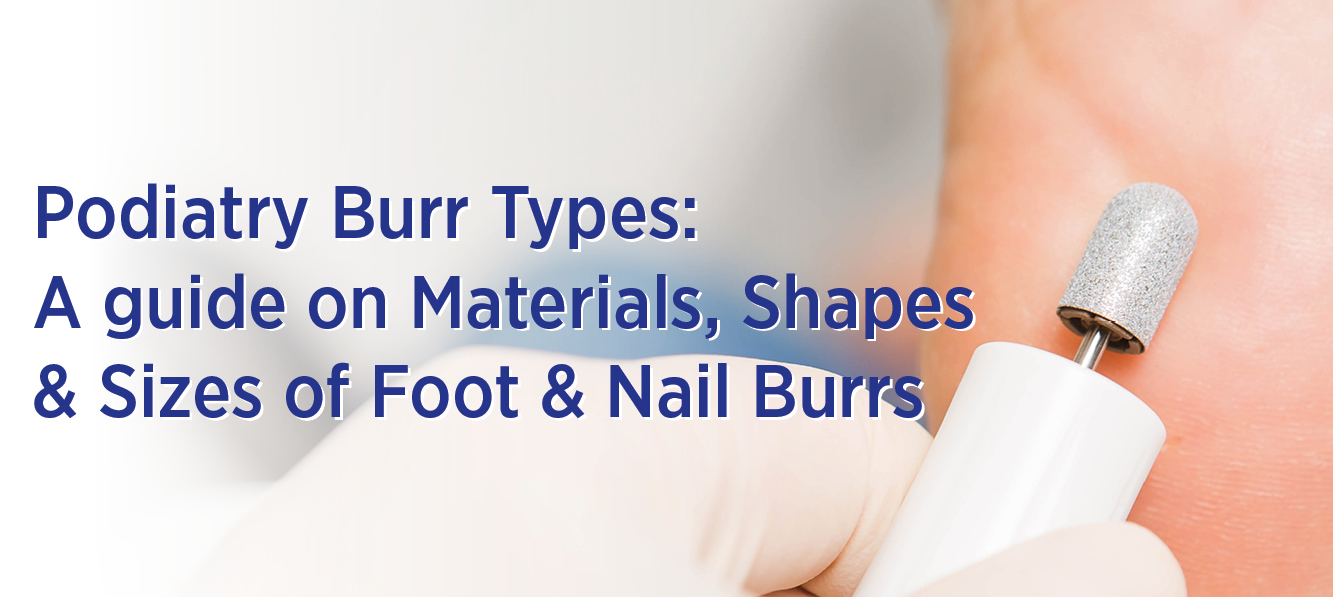
Podiatry Burr Types: A guide on Materials, Shapes and Sizes of Foot and Nail Burrs
Canonbury Healthcare offers a wide range of podiatry burrs, available in various shapes, sizes, and finishes to suit different clinical needs, including both single-use and reusable options
What are Podiatry Burrs?
A podiatry burr is a small rotary tool that fits into the handpiece of a suction or spray drill. The diameter of the burr shank must be between 2.33mm and 2.35 mm to fit into the drill handle. The burr size and finish will determine the speed at which it can be used. It is usually between 10,000 and 35,000 rpm (revolutions per minute).
Uses within podiatry - reduce the thickness of pathologically altered tissue - nails or skin, this could be due to pressure / damage or a fungal infection.
The reusable burrs are bought singly however the single use burrs can be bought in multiples giving the practitioner a saving.
Key Features of Podiatry Burrs
Different types of podiatry burrs are designed for specific clinical tasks, and selecting the correct burr is essential for both patient safety and treatment efficiency.
For example, when treating thickened nails, a carbide burr is ideal as it removes larger sections of nail while producing less airborne dust. In contrast, using a fine grit burr on the same nail may be ineffective and time-consuming.
Using the wrong burr, or applying it for too long, can generate heat which may be uncomfortable or even dangerous for patients. In individuals with neuropathy, such as those with diabetes, this can result in blistering or tissue necrosis beneath the nail, as they may not feel the heat in time to react.
It’s also important to ensure the burr’s shank size matches your handpiece. Using the wrong size or a bent shank can cause excessive vibration, poor rotation, and even damage to your drill through slippage or internal wear.
Finally, choosing a cheaper burr, or one not intended for podiatry use, can compromise treatment. Poor quality burrs may have an unsuitable finish, shorter lifespan, or risk delamination, all of which can negatively affect patient outcomes and increase replacement costs.
Burrs - Filing & Finishing - Blades & Instruments
Podiatry Burr Sizes
A burr size can be measured across the working end of the burr - D on the image below. This is what the size Dia 060 / 080 etc. refers to.
Taken from the Busch Podiatry catalogue pg. 7
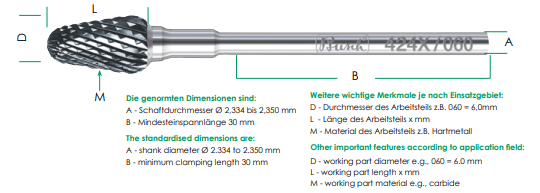

Small Podiatry Burrs for Precision Work
The smallest burrs available from Canonbury Healthcare are the type 801 and the enucleator, both designed for detailed, precision work in podiatry.
These burrs are commonly used for:
· Releasing a haematoma beneath the nail
· Nail fenestration
· Treating corns within callus or under the nail
· Working around the nail sulci and cuticles, particularly with the Ony-Clean burr
Advantages:
These small burrs offer excellent precision, making them ideal for delicate areas that require careful, targeted treatment, helping to minimise trauma while improving clinical outcomes.
Medium Podiatry Burrs: Versatile and Practical
Uses:
Medium podiatry burrs are designed for general reduction of both skin and nails. They are often used to smooth and refine areas following initial debridement with nippers or a scalpel.
Advantages:
These all-purpose burrs are highly versatile, allowing practitioners to move seamlessly between skin and nail work without needing to switch instruments during treatment. This improves efficiency while maintaining precision and comfort for the patient
Ceramic Burrs - Medium Dia 060
Large Podiatry Burrs: Ideal for Callus Reduction
The largest burrs available from Canonbury Healthcare include the DIA 80, DIA Twister 12mm, Busch Hybrid Cap, and 16mm Single-Use Abrasive Caps.
Uses:
These large-diameter burrs are ideal for treating heel callus and other extensive areas of hard skin. Their size allows for efficient removal of thick tissue, helping to reduce treatment time while maintaining patient comfort.
Busch Tungsten Carbide Burr Type 424X dia 070 and 080
Podiatry Burr Shapes
Bud Podiatry Burr: A Reliable All-Rounder
The Bud burr is a versatile tool ideal for reducing excessive callus or thickened nails. Its narrow, tapered tip allows easy access to smaller or more contoured areas of the foot.
Uses:
- Removing thickened skin or nails
- Accessing tight or difficult to reach areas
Advantages:
As an all-round general-purpose burr, the Bud burr can be used across multiple treatment areas, making it a practical and efficient choice for routine foot care.
Pear Podiatry Burr: Ideal for Finishing and Nail Reduction
The Pear burr features a large, rounded head, making it well-suited for finishing areas of callus after debridement with a scalpel.
Uses:
- Smoothing and refining callused skin
- Reducing nail thickness using the burr's side surface
Caution:
While the pear shape offers excellent surface coverage, care should be taken when working near the nail sulci, as the larger head may reduce visibility and precision in these tighter areas.
Tapered Podiatry Burr: Precision for Fine Work
The Tapered burr, narrowing to a fine point, is perfect for accessing small, hard-to-reach areas and performing detailed work, such as finishing treatments or removing dry skin.
Uses:
- Precision removal of fine skin
- Targeted reduction of callus and nail thickness, thanks to its barrel shape tapering to a point
This burr offers versatility and accuracy, making it an essential tool for meticulous podiatry care.
Blunt Cone Podiatry Burr: Safe and Effective Nail Reduction
The Blunt Cone burr features a smooth, non-diamond-tipped end, allowing for the safe reduction of nail thickness without risking damage to the sensitive nail sulci.
Uses:
- Reducing nail thickness gently and precisely
- Treating apical callus without catching or harming adjacent toes
This burr is ideal for careful work near delicate areas, minimising patient discomfort while delivering effective results.
Ball Cutter Podiatry Burr: Precision Fenestration and Pressure Relief
Ball Cutter burrs are ideal for fenestration - creating small openings in the nail to allow antifungal treatments to reach the skin beneath without removing the entire nail
Uses:
- Releasing pressure from a haematomoa under the nail
- Removing corns, including tiny seed corns
Their precise shape makes them perfect for targeted treatments that preserve surrounding tissue and improve patient comfort.
Dia Twister Podiatry Burr: Optimised for Spray and Suction Drills
Unlike standard burrs, Dia Twister burrs are specially designed for use with spray or suction drills. When used with a spray drill, the slits in the burr allow water to cool the treatment area, helping to prevent overheating and patient discomfort.
When paired with a suction drill, these slits enable efficient dust removal, maintaining a cleaner working environment.
Uses:
- Removing thickened nails
- Reducing callus effectively
Podiatry Burr Grit Levels. Choosing the Right Abrasiveness
Different grit levels on podiatry burrs are essential for effectively reducing nail and callus thickness while ensuring patient comfort and safety.
- For fine finishing work or removing small amounts of tissue (e.g., edges of callus or nails), a fine grit burr is ideal.
- For larger areas with heavy callus or thick nails, starting with a coarse grit burr allows for quicker removal, followed by finishing with a fine grit or polisher for smooth results.
Busch manufactured burrs have a colour coding on their shank to what grit they are
- 2 black rings - mega coarse - removal of heavy thickened hard callus.
- 1 black ring - super coarse - removal of hard callus
- 1 green ring - coarse - removal of callus and coarse removal of nail
- No ring - medium - all rounder - removal of callus and nail
- 1 red ring - fine - delicate treatment of nail and sulci
- 1 yellow ring - super fine - delicate treatment of cuticle and pre-polishing of nails.
The dia twisters follow the same as above apart from they also have a white ring as they are a combination of ceramic and diamond deb. The white indicates ceramic.
Busch Podiatry Products and Equipment | Canonbury
All burrs on the Canonbury Healthcare website apart from the Busch ones are classed as a medium grit, therefore they are suitable for removing callus and nail. With care they can also be used for corn removal, cuticle and nail sulci care.
Burrs - Filing & Finishing - Blades & Instruments
Podiatry Burr Materials
While grit level plays a key role in burr performance, the material of the burr is equally important. Traditionally, podiatry burrs have been coated with diamond on the outer surface for durability and effectiveness.
All burrs offered by Canonbury Healthcare are crafted from instrument-grade stainless steel, which is non-magnetic. This feature is crucial during sterilisation, as it helps prevent corrosion and rust, ensuring longevity and safety in clinical use.
Ceramic Burrs
Canonbury Healthcare stocks ceramic burrs manufactured by Busch in Germany, with specific letter codes indicating their intended use:
- GQSR: High abrasion performance, ideal for very thickened nails, gryphotic nails, acrylic, and silicone.
- X: Available in medium or fine grit; at Canonbury Healthcare, these are medium grit, suitable for gryphotic nails and gel applications.
The numbers correspond to the burr shape.
Ceramic heads are especially beneficial for patients with metal allergies, offering a hypoallergenic alternative. Their primary advantages include exceptional durability, superior cooling during nail removal, and the ability to deliver a smooth, polished finish after treatment.
Tungsten Carbide Burrs
Tungsten carbide burrs, manufactured by Busch in Germany, are designed specifically for use on nails with abnormal thickness They are not recommended for callus removal. The code ending with “X” indicates their intended use, while numbers such as 425 refer to the burr’s shape.
Thanks to their manufacturing process, tungsten carbide burrs offer exceptional longevity. They efficiently remove large sections of thickened nail, helping to minimise dust production during treatment.
Diamond Burrs
Diamond encrusted burrs are used for nail reduction and callus reduction. They can be used in the ball burr shape for removal of corns. These are a practitioner's everyday burr.
Hybrid Burrs
Hybrid burrs combine ceramic and diamond materials, offering the benefits of both. They enable faster rotations per minute (RPM) and quicker nail removal, while also providing excellent cooling properties to enhance patient comfort during treatment.
Single use and Reusable Burrs
Advantages of Single use Burrs (Burr Caps)
Single-use burrs and caps come pre-sterilised and ready to use, eliminating the need for decontamination and significantly reducing the risk of cross-contamination between patients.
Using disposable burrs also ensures that the selected grit level is appropriate for each specific treatment, providing consistent performance and peace of mind for practitioners.
Advantages of Reusable Burrs
Reusable burrs offer a longer lifespan and can be more economical over time. However, they require proper processing and sterilisation to prevent cross-contamination. If not handled carefully, such as improper decontamination or accidentally dropped while in use, reusable burrs can become damaged and costly to replace. Over time, repeated use can cause a medium grit burr to wear down to a finer grit, which may increase strain on the drill, practitioner fatigue, and patient discomfort.
At Canonbury Healthcare, we stock both single-use and reusable burrs, recognising that preferences vary. We do not favour one option over the other but aim to support practitioners in choosing what best suits their clinical needs.
Podiatry Burr FAQ:
How to Clean Reusable Podiatry Burrs
To properly clean reusable podiatry burrs, first wash them thoroughly to remove visible debris. Then, use an ultrasonic cleaner with a suitable cleaning solution to eliminate any remaining residue. Finally, sterilise the burrs in an autoclave to ensure they are completely free from contaminants.
Because podiatry burrs may come into contact with blood or body fluids, it is essential to clean and sterilise them between treatments to prevent the risk of cross-contamination and maintain patient safety.
How often do reusable podiatry burrs last before needing to be replaced?
The lifespan of reusable podiatry burrs varies widely and is difficult to specify precisely. It depends on factors such as:
- Frequency of use
- Types of nails or callus treated
- Whether the correct grit was used for each condition
- Proper handling and care, including avoiding drops or damage during treatment
Regular inspection of the burr’s condition and performance is key to determining when replacement is necessary to ensure patient safety and effective treatment.
Are all podiatry burrs compatible with all podiatry drills?
At Canonbury Healthcare, all podiatry drills are designed to accommodate burrs with a 3.0mm shank size. It’s important to ensure that the burr you select matches this specification for compatibility and optimal performance.
Baehr Pur Via Dust Extraction Drill
Berchtold Podo-Q Dust Extraction Drill - Podiatry Drills
Berchtold Podo S60 Spray Drill
What type of podiatry burr is most expensive?
The most expensive burrs stocked by Canonbury Healthcare are the Busch Dia Twister burrs. These advanced hybrid burrs combine ceramic and diamond grit, offering exceptional durability and longer service life.

